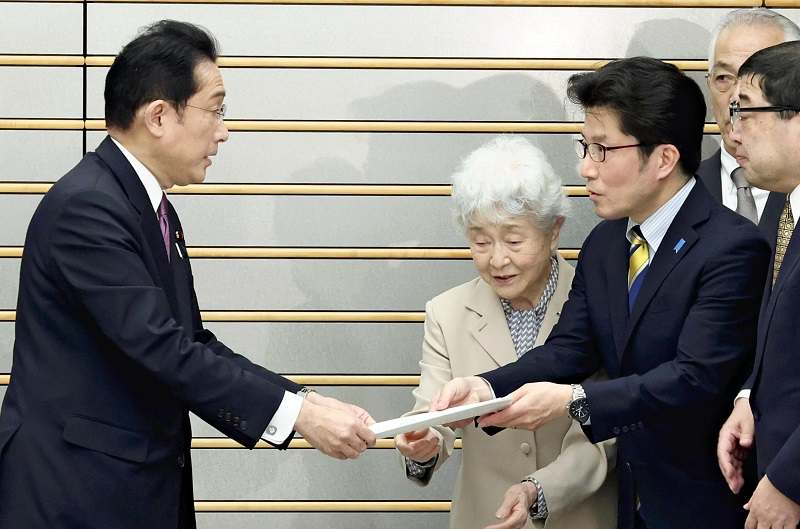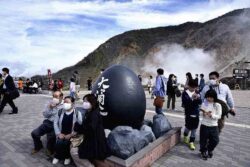In search of lost time 20 years after Pyongyang summit / Angry over lack of progress, families seek summit

Takuya Yokota, far right, and his mother, Sakie, hand a policy statement of the Association of Families of Victims Kidnapped by North Korea to Prime Minister Fumio Kishida at the Prime Minister’s Office on March 16.
The Yomiuri Shimbun
20:00 JST, September 24, 2022
This is the fourth installment of a five-part series reflecting on the experiences of Japanese nationals abducted by North Korea, some of whom have returned to Japan, and their families over the past 20 years since the 2002 Japan-North Korea summit.
***
He never thought he would be at the forefront of rescue efforts.
Takuya Yokota, 54, is the younger brother of Megumi Yokota, who was abducted when she was 13. The third head of the Association of Families of Victims Kidnapped by North Korea, he has marked 20 years since the Japan-North Korea summit meeting in September 2002.
“I want to express gratitude once again that we were able to get five abduction victims and their families back to Japan at that time. However, even 20 years later, my sister and other victims have yet to be rescued,” Yokota said in a restrained tone at a gathering in Tokyo on Sept. 16.
“We’ve had various ups and downs, but I always have doubts whether our voices are really heard,” Yokota said, looking back over the two decades since the summit.
The association was formed in March 1997 by the families of eight abductees, after suspicions were raised that Megumi might have been abducted. The first head of the group was Yokota’s father, Shigeru, who died in June 2020 at the age of 87.
Since the summit was held five years later in 2002, the association has met with each new prime minister or state minister in charge of the abduction issue, to ask that the abductees be brought home.
In response, the officials have always made such pledges as “I will make this one of the most important issues for my government” and “I’ll do my best, utilizing every opportunity.” Each time the association has renewed its hope for the return of the abductees.
To gain the support of the international community, family members of abductees also met often with the U.S. government and Congress, and traveled to Geneva, where a working group of the then U.N. Human Rights Commission had meetings.
Yokota went to the United States with his mother, Sakie, now 86, and others in April 2006 to ask then U.S. President George W. Bush in Washington in person for cooperation.
Bringing with them photos of the abductees, family members have also met with the succeeding U.S. presidents — Barack Obama, Donald Trump and Joe Biden — when they visited Japan.
“I don’t think the Japanese government has done nothing. I won’t say they have no strategy,” Yokota said. “But none of the other abductees have been rescued over the last 20 years. I’m angry at this strange reality.”
“It’s taking too many years! The parents of the victims are passing away,” said a participant at a gathering for rescuing abductees in Chiyoda Ward, Tokyo, in May, following a speech by Prime Minister Kishida.
“It was rude to talk that way, but I understand that person’s feelings. So much time has passed [without results],” said an abductee’s family member who attended the event.
Since the summit, the association has taken a hardline stance on North Korea and supported imposing economic sanctions against the nation.
It said at one point it did not want negotiations to resume for the normalization of diplomatic relations, which was included in the Japan-North Korea Pyongyang Declaration, without the resolution of the abduction issue.
The association later changed its stance, saying in a message addressed to North Korean leader Kim Jong Un released in February 2019, “We have no intention of opposing the normalization of diplomatic relations if all the abductees can immediately return to Japan.”
As the message could be interpreted as a concession to North Korea, some have questioned why the victims’ side must assume such a humble attitude. Their move was prompted by the cruel fact that victims have still not returned home and their family members are growing older.
“We made a difficult decision so as to get our family members back,” Yokota said.
North Korea has not responded to the earnest wish of the families.
After releasing the message, Kayoko Arimoto and Shigeru Yokota, who were the mother and father of abductees, respectively, died one after another.
The association released a second message in April 2021, urging North Korea to resolve the issue as soon as possible, adding that “victims and their parents must be able to embrace each other.”
“We’re having a tough time. I assume North Korea is also struggling due to the effects of the economic sanctions and the novel coronavirus pandemic,” Yokota said. “It’s time for the top leaders of Japan and North Korea to meet and find a way to resolve the abduction issue.”





